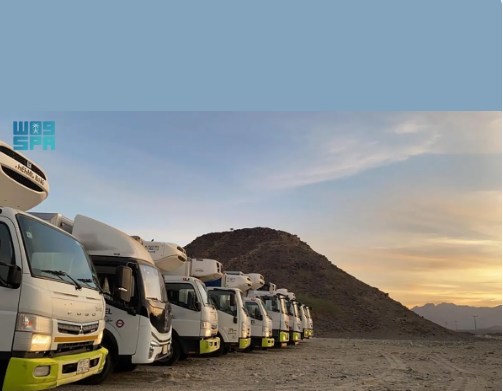Publisher: Maaal International Media Company
License: 465734
Red Sea Global Uses Sustainable Fuel for All Its Supply Chain Vehicles
The Red Sea Global has taken another pioneering step in its commitment to attain a sustainable transport system by restricting the use of low-carbon biofuel in all its delivery trucks, having the entire fleet of its onshore vehicles now powered by electricity or biofuel, the first Saudi company to operate an environment-friendly supply chain.
The Red Sea Global currently operates a fleet of six 8-ton refrigeration trucks and three 3.5-ton refrigeration trucks, all powered by biofuel. The vehicles serve a wide range of facilities and play an active role in the long-range supply chain network, ensuring smooth transportation of goods to all the company’s projects and facilities.
Sustainable biofuels are used to operate all cargo delivery trucks to the four Red Sea hotels: Turtle Bay Hotel, Six Senses Southern Dunes, St. Regis Red Sea Resort, and Nujuma, a Ritz-Carlton Reserve, as well as to the Red Sea International Airport, where the transition from normal fuel to biofuels not only reduces carbon emissions, but also increases the life of the vehicles’ engines, bringing environmental and operational benefits.
اقرأ المزيد
Biofuels are produced from local sources of cooking oil. The type adopted by the Red Sea Global produces only 0.17 kilogram of CO2 equivalent per liter, compared to 2.7 kilograms for normal diesel fuel.
To monitor the efficiency of this environment-friendly approach, the Red Sea Global has launched sophisticated technologies, with each vehicle equipped with a chip to measure the amount of biofuels used daily. This data enables fleet managers to analyze and improve fuel consumption, thus boosting the company’s environment-conservation efforts.
Due to the fact that the Red Sea Global already uses 100% solar-generated electricity to power its vehicles, the company’s land transport fleet now emits very little carbon.
This achievement also supports the ambition of the Red Sea Global to shift to green hydrogen throughout its transport sector. By 2030, the company aims to have between 700 and 800 vehicles in its sustainable vehicle fleet, effecting a qualitative shift in the way goods are transported in Saudi Arabia, and setting a new standard for sustainable supply chains.








